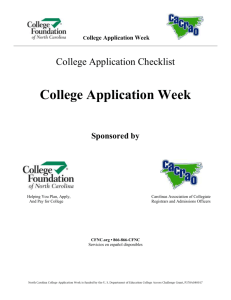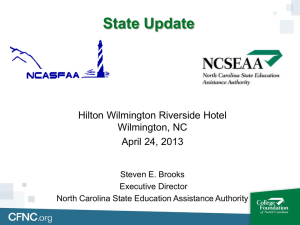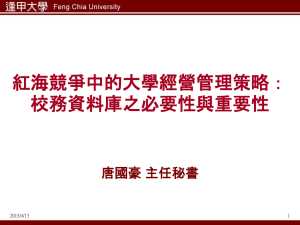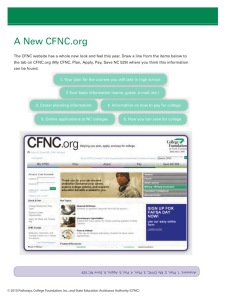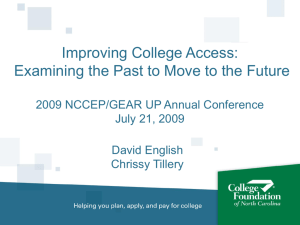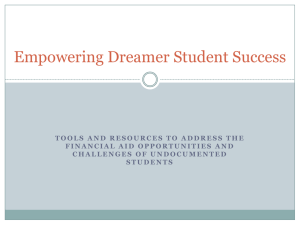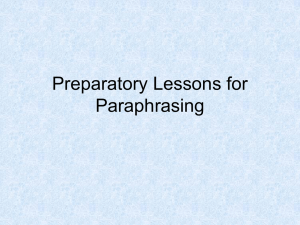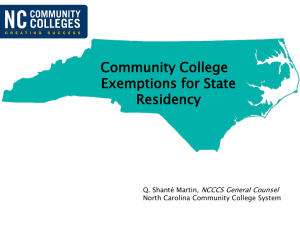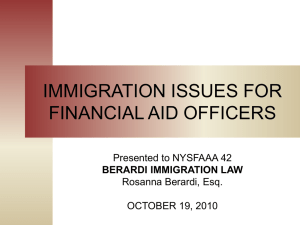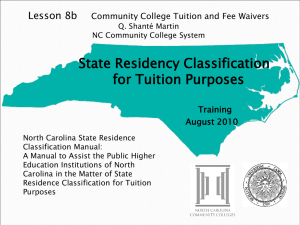PowerPoint Template Title Date
advertisement
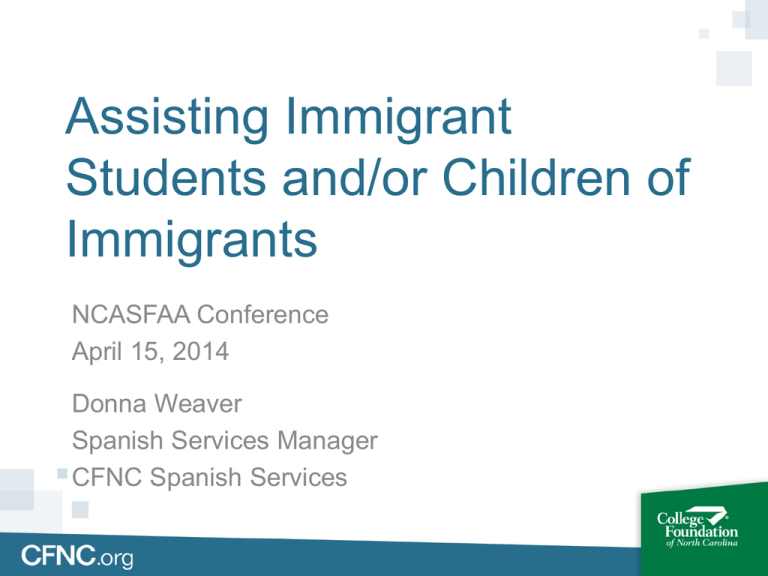
Assisting Immigrant Students and/or Children of Immigrants NCASFAA Conference April 15, 2014 Donna Weaver Spanish Services Manager CFNC Spanish Services Did you know? CFNC.org ….. • Has provided free college and career planning resources for North Carolina’s students since 2000 • Offers free professional development opportunities for educators, and informative presentations for students, parents, and community organizations • Hosts a career planning hub customized with NC Data College Foundation of North Carolina Spanish Services: A Statewide Initiative • Provide information and resources to Latino students and their families • Collaborate with NC schools to increase Latino student success and cultivate opportunities for family involvement • Increase the number of Latino students who enroll and succeed in post-secondary education CFNC Spanish Services Connecting Students to College Wednesday Webinar Series at CFNC.org CFNC.org Workshops for counselors, educators and advocates An endeavor to be more aware of barriers to students’ access to college and success, and to share tools and free resources from CFNC and other non-profit organizations CFNC Spanish Services • Spanish-language, toll-free call center, 866-866-CFNC (option 3) • Spanish-language email center, espanol@cfncresources.org • Spanish-language career and college planning publications CFNC.org CFNC Spanish Services • Spanish-language career and college planning information at CFNC.org • • • • CFNC.org cfnc.org/collegeworks cfnc.org/adelante Plan for a Career Financial Aid and Special Populations CFNC Spanish Services • Distribute college planning publications through partner agencies and non-profit organizations • Share and exhibit CFNC information and services at community, church or school events • Spanish-language workshops at community, church or school events. CFNC.org Today’s Goals • Explore common and uncommon questions immigrant students and their families encounter in the college going process • Share solutions and resources that are available • YOU are invited to share your successes, questions, experiences and perspective Serving Immigrant Families • Immigrant parents from Latin America and other countries worldwide are new to the higher education system in the United States. • Immigrant parents want their children to go to college in order to have a career, a bright future, and a better life, but the main barrier is that they do not know the "steps" involved and may not be aware of financial aid and scholarships. Strengths of immigrant children and children who have immigrant parents: • Bilingual Language Development • Social Competence Across Cultures • Strong Family Relationships • Education as a Family Value Student Voices and Perspectives: • Mundo, Juan and Esteban are brothers who grew up in an eastern, NC farming-community. • Mundo and Juan regularly missed school to help out in the fields. Academically they were not reaching their potential, and the plan was to drop out in 10th grade. • Then, one day, Mundo and Juan received an unexpected opportunity, and they were the first in their family to go to college. Esteban, who is the youngest, became an attorney. • In this story, Esteban says “thank-you” as he credits his brothers for his own academic and career success. • Let's listen to their story... What are some of the challenges Juan’s family needed to overcome to access higher education? Is his family the exception or the rule? An Email from a Counselor in Eastern NC, January 3, 2013 Dear Ms. Weaver, Xxxxx Xxxx from Southern Xxxx High School has been in contact with you for a few years now. He has obtained a Social Security card and number with the comment "For Work Purposes Only". He received his card right after the recent deferred action decision. He now wants to know if he is eligible to apply for federal financial aid by completing the FAFSA. How would you advise him on this situation? Would attending FAFSA Day be a good idea or could his family's accountant be able to assist him better? Deferred Action for Childhood Arrivals: DACA On June 15, 2012, President Obama issued an Executive Order: “Effective immediately, certain young people who were brought to the United States through no fault of their own as young children and meet several key criteria will be considered for relief from removal from the country or entered into removal proceedings. Those who demonstrate that they meet the criteria will be eligible to receive deferred action for a period of two years, subject to renewal.” Eligibility for DACA • Have come to the United States under the age of sixteen; • Have continuously resided in the United States for at least five years preceding June 15, 2012 and are present in the United States on June 15, 2012; • Currently be in school, have graduated from high school, have obtained a general education development certificate, or are honorably discharged veterans of the Coast Guard or Armed Forces of the United States; • Have not been convicted of a felony offense, a significant misdemeanor offense, multiple misdemeanor offenses, or otherwise pose a threat to national security or public safety; • Not be above the age of thirty. An estimated 65,000 undocumented, under-documented and DACA students graduate from U.S. high schools each year Similar to Peers Low-income Poor academic preparation First-generation college student Limited access to college info and support Different from Peers Not eligible for federal or state financial aid or in-state Tuition in NC DACA Changes Gain legal employment Eligible for driver’s license Eliminates fear of discovery and deportation Plyler Vs. Doe 1982 The U.S. Supreme Court invalidated a Texas law authorizing school districts to bar undocumented students from public elementary and secondary schools. • The court noted that the statute imposed a “lifetime hardship on a discrete class of children not accountable for their disabling status.” • The case did not address explicitly the question of postsecondary education, however, Legislative Counsel has suggested that Plyler v. Doe would not apply to postsecondary education. • Elementary and secondary education (K –12) is a fundamental and protected right. All children, including undocumented children, can attend any public elementary and secondary school free of charge. Currently, there are 16 states in the U.S. with policies that allow eligible undocumented students to pay in-state tuition. To be eligible in these states, students must: • Attend at least 3-years of high school in that state AND • Graduate from a high school in the state. Texas, California, Utah, Illinois, Washington, New York, Kansas, New Mexico, Nebraska, Oklahoma, Wisconsin, Colorado, Maryland, Oregon and Connecticut. Rhode Island and Hawaii have similar versions, but with exceptions. Are there any exceptions in NC of which people should be aware? • TPS- Temporary Protective Status El Salvador, Haiti, Honduras, Nicaragua, Somalia, Sudan, South Sudan, Syria • I-797 (Receipt from USCIS that application for Legal Permanent Residence, aka Green Card, has been submitted and fees have been paid) An Email from a Counselor in Eastern NC, April 1, 2014 Hello Donna, I hope you are well. Jxxxxxx and I have a question. There is a student I have been working with trying to get him into a four year institution. He has been accepted into Xxxxx College, a private school, in South Carolina and has plans to go in the fall. We are seriously considering attending the open house and would like to know if you would like to come with us? The event is April XXth from 8am-12pm. Ms. Xxxxx had the fabulous idea of inviting you, as well as the student's mother, along. Please let me know if you are interested? States which have more restrictive policies than NC: • Arizona and Georgia specifically bar undocumented immigrants from receiving instate tuition rates. • South Carolina and Alabama prohibit undocumented students from enrolling in state colleges at all. An Email from a Counselor in Eastern NC, April 3, 2014 Hello everyone, After speaking with the student and discussing all of the measures we would have to take to ensure everyone's safety and the details we would have to plan, the student decided not to attend the open house. He decided to wait seeing as how he also just started a new job and has not built up enough time to take the full day off. When combined with all of the logistics, he felt it was just too much too soon. Thanks for being so willing to help us with this. An Email, March 21, 2014 Hello, My name is XXXX and I was wondering if you can help or advise me with financial aid? I applied to XXCC because someone told me they were going to allow deferred action students to pay in-state tuition if a church would sponsor them; however they have changed the policy. They are no longer doing that, and I am not able to afford college. My mom heard about a story where an immigrant student had a sponsor or someone who paid for him. Do you know of any thing related this? If you know of any scholarships or other ways to pay for college would you please let me know? Thank you! Business Sponsor Exception • Pursuant to N.C.G.S § 115D-39(a), “when an employer other than the Armed Forces . . . pays tuition for an employee to attend [a community college] and . . . the employee works at a North Carolina business location, the employer shall be charged the in-state tuition rate.” If a student with DACA classification is employed at a North Carolina business location and the employer of the DACA student working at the North Carolina business location wants to pay for the DACA student to attend a community college, the employer shall be charged the in-state tuition rate. (Shante Martin, NCCSS, memo dated 9/12/13) Text message, March 10, 2014 Hi! This is Xxxxx, and I am confused about how to apply for financial aid. I am a US citizen but my parents do not have social security numbers. I don’t know if I can do the FAFSA? My parents are married and do their taxes together. They earned about $45,000 in 2013. I’m also thinking they earned too much money for me to qualify for financial aid. There are three kids at home and two of us will be in college in the fall, hopefully. I’m a good student. My GPA is about 3.5 to 3.7, and it is my dream to become a nurse. Thanks for any advice you can offer! For FAFSA Completion: For eligible students whose parent(s) does not have a social security number, and it is a required field for FAFSA completion, use 000-00-0000. What about PIN and electronic signatures? Resources on CFNC.org: • Grants Forecaster • Net Price Calculators • Forgivable Education Loans for Service A Phone Message from December 2013 Hello, I would like to open a CFNC 529 Savings Plan for my daughter. She was born, here, in NC, and she is five-years old. My husband I do not have social security numbers, but we do file our taxes using an ITIN number which was issued to us by the IRS. Am I eligible to open a 529 plan for my daughter? Thank you! From the Experts at CFI • If the parent is going to be the Participant on the Account he/she will need a SSN or TIN. If they cannot provide either of these they will not be able to participate. • The student could still be a Beneficiary on an Account but they would need someone willing to create and manage the account with a valid SSN or TIN. Email from XXXXX (Monica’s Son), dated March 17, 2014 Hey so I got into XXXX college and I got my financial aid for school letter saying how much I got for it but when do I get it or how does it go from here. Sent from my iPhone Dear XXXXX, The next step would be to contact this person. Let me know how it goes. Donna An Email from March 22, 2014: Good afternoon, my name is Xxxxxxx. I have questions about going to college. I'm a senior at West Fxxxxx High School and I'm very exited about college. But I was wondering what kinds of government help I could get to pay college? Or how to even start. Could you help me? -Sincerely Xxxxxxx Students Need Mentors, Role Models and Encouragement • Student Support Groups • High School Clubs • Student Alumni • College student groups • Individualized counseling and guidance Parents Need College Knowledge • Involve parents in college preparation process • Develop parent support groups • Provide information in parents’ native language • Connect parents to community resources Two of the most effective ways to help students reach their college goals: • Fostering positive connections with students and their families • Provide culturally sensitive and informative sessions on how to plan for college and a career • Research from NCSU A Conversation with a Student, October 2013 Well, you know that XXX (private college) awarded me a $22,000 scholarship, and I make about $4000 a year with my job on campus. I also received three local scholarships when I graduated from high school in June. I am staying busy on weekends as a volunteer and mentor for XXXXX (organization), where I earn a small stipend. Even with this generous help, my parents and I still borrowed $5000 to pay for this school year. Do you know of any scholarships that I could apply for? I don’t want to have to continue borrowing so much? Since I have Deferred Action, I don’t qualify for any federal or state grants. Online Resources Hispanic Scholarship Fund The North Carolina Society of Hispanic Professionals Adelante NC The Tomorrow Fund for Hispanic Students Student Action with Farmworkers: Into the Fields Internship Golden Door Scholars Email from a Student, March 15, 2014 • Hey Donna, This is Xxxxxx Xxxxx. I am a local high school student here in the triad, and I am trying to get in contact with you to ask for some help with my graduation project regarding CFNC. If you could just e-mail me back soon. Thank you! The Graduation Project: El Futuro Esta En Nuestras Manos Fecha /Date: Abril/April 2 6:00 PM – 7:30 PM Lugar/Place: Randolph-Asheboro YMCA Community Room Información para padres Y estudiantes relacionado a solicitudes de colegio e información/ Information for parents and students related to college and college applications Conversation with a Parent who attended the Graduation Project, April 2, 2014 I want to ask you about a program that my son has been invited to participate in? Last Saturday, we attended a seminar, similar to the one tonight, and we listened to presentations about colleges, and costs and financial aid. It all sounded very nice, and we enjoyed it. At the end, we were asked to sit down at a table with a representative who told us, that in order for my son to participate in the program, we would need to pay $2000. They accepted credit cards. The service they offered us included helping my son identify and apply to a good college. They, also, said they could guarantee he would get a scholarship. When they reminded us how much college costs, it seemed like a good deal. What do you think? Serving Immigrant Parents In NC: An Email, 2/26/14 Good Morning Ms. Weaver, I hope you are having a great day. My name is Xxxxx Xxxxxx and I am an intern with Xxxxx Xxxxx at Xxxx Xxxxx Elementary school. We wanted to thank you again for coming to speak with our Spanish speaking parents. We would also like to request an additional presentation for our Karen and Burmese parents. They've expressed concern about their unfamiliarity with the process of preparing for college in the American system. Xxxxx thinks your presentation will help them greatly. We would like to try to schedule this meeting for a Thursday morning in April. Please let know me if you have availability during these days. We will also provide a translator to work with you and the parents. • Best wishes, • Xxxxx Xxxxxx People: Voices and Perspectives San Francisco State University Graduate Pulitzer Prize-Winner: Jose Antonio Vargas People: Voices and Perspectives UNC-Chapel Hill Student: Emilio Vicente People: Voices and Perspectives Salem College Student: Valeria Sotelo Thank you for attending this session!
